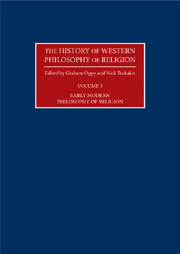Book contents
- Frontmatter
- Contents
- Editorial Introduction
- Contributors
- 1 Early Modern Philosophy of Religion: An Introduction
- 2 Niccolò Machiavelli
- 3 Martin Luther
- 4 John Calvin
- 5 Michel de Montaigne
- 6 Francisco Suárez
- 7 Thomas Hobbes
- 8 René Descartes
- 9 Ralph Cudworth
- 10 Blaise Pascal
- 11 Baruch Spinoza
- 12 John Locke
- 13 Gottfried Wilhelm Leibniz
- 14 George Berkeley
- 15 Voltaire
- 16 The Deists
- 17 Jonathan Edwards
- 18 Thomas Reid
- 19 David Hume
- 20 Denis Diderot
- 21 Immanuel Kant
- 22 Gotthold Ephraim Lessing
- 23 William Paley
- Chronology
- Bibliography
- Index
23 - William Paley
- Frontmatter
- Contents
- Editorial Introduction
- Contributors
- 1 Early Modern Philosophy of Religion: An Introduction
- 2 Niccolò Machiavelli
- 3 Martin Luther
- 4 John Calvin
- 5 Michel de Montaigne
- 6 Francisco Suárez
- 7 Thomas Hobbes
- 8 René Descartes
- 9 Ralph Cudworth
- 10 Blaise Pascal
- 11 Baruch Spinoza
- 12 John Locke
- 13 Gottfried Wilhelm Leibniz
- 14 George Berkeley
- 15 Voltaire
- 16 The Deists
- 17 Jonathan Edwards
- 18 Thomas Reid
- 19 David Hume
- 20 Denis Diderot
- 21 Immanuel Kant
- 22 Gotthold Ephraim Lessing
- 23 William Paley
- Chronology
- Bibliography
- Index
Summary
William Paley was a clergyman, philosopher, and religious apologist, best known for his classic presentation of the argument from design. Born in July 1743 in Peterborough, England, Paley trained for the Anglican priesthood at Christ's College, Cambridge. He was later appointed fellow and tutor at Christ's College and lectured in various philosophical subjects, most significantly in moral theory. He rose gradually through the ranks of the Anglican Church, eventually becoming Archdeacon of Carlisle, and sub-dean at Lincoln Cathedral. His latitudinarian views and insistence on basing Christian belief and ethics on reason raised suspicion in some quarters. This may have prevented him from higher appointments in the Church. He died on 25 May 1805.
Paley's major work consists of four books. His Cambridge lectures on ethics were published as The Principles of Moral and Political Philosophy (hereafter Principles; [1785] 2002). The book does not delve deeply into foundational questions, but is intended rather as a practical guide. Principles presents a simple utilitarian view rooted in a theological understanding, suggesting that “what promotes the general happiness is required by the will of God” (ibid.: 47). Accordingly, Paley defines virtue as “the doing of good to mankind, in obedience to the will of God, and for the sake of everlasting happiness” (ibid.: 25). Like other utilitarian thinkers, Paley rejects the idea that we are blessed with a moral sense, arguing that our intuitive moral judgements are more a reflection of our arbitrary prejudices than of moral truth.
- Type
- Chapter
- Information
- The History of Western Philosophy of Religion , pp. 303 - 312Publisher: Acumen PublishingPrint publication year: 2009
- 1
- Cited by

